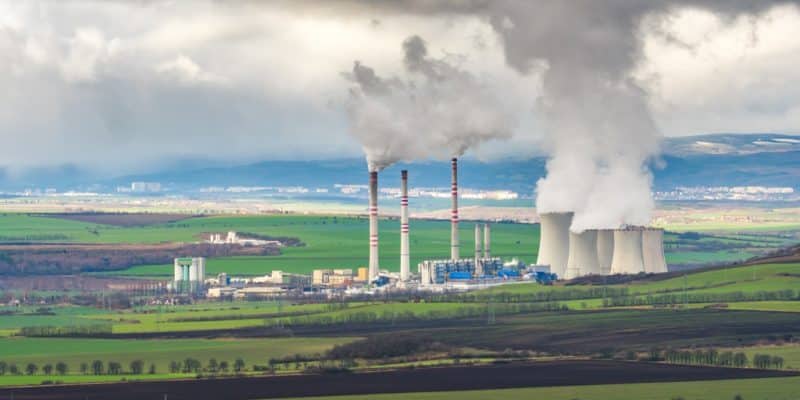The climate change that is accelerating around the world requires a reduction in the greenhouse gas (GHG) emissions responsible for global warming. Worldwide, industry is the third biggest emitter of carbon dioxide (CO2). To mark African Climate Week (ACW), which opens on 4 September 2023, Afrik 21 takes a look at the issues at stake and the efforts being made to decarbonise industry in Africa.
Africa accounts for just 4% of global greenhouse gas (GHG) emissions. Yet it is the continent most affected by climate change, which is threatening livelihoods and hampering economic development. However, this situation should not obscure the need for the continent to move towards sustainable economic growth. And this involves several key sectors, notably industry.
Globally, this sector accounts for 21% of greenhouse gas emissions, according to the Intergovernmental Panel on Climate Change (IPCC). Although Africa’s share of global manufacturing is only 1.9%, its industrialisation is accelerating. In recent years, the industrial sector’s contribution to gross domestic product (GDP) on the African continent as a whole has jumped by 130%, according to the African Development Bank (AfDB).
Decarbonising the extractive industries
This trend is set to continue over the next few years, with several countries and major sub-regional groupings deciding to process their natural resources locally. This is particularly true of the Central African Economic and Monetary Community (CEMAC), which has finally reversed the decision taken by its member states to ban the export of logs. This policy should encourage local wood processing. Gabon has already started processing wood, with the installation of a factory in the Nkok special economic zone (ZES) 27 km from Libreville.
Read also- MALI: a hybrid solar power plant comes on stream at the Nampala mine
In West Africa, Guinea also wants to process its bauxite locally, with reserves estimated at 40 billion tonnes. This is a heavy industry that will require large amounts of energy. Rich in natural resources and rare earths, the Democratic Republic of Congo (DRC) also wants to process its resources locally, to take advantage of the market for electric cars, which is expected to be worth 7,000 billion euros by 2030, according to… It is in the extractive industry that we are seeing a certain dynamism in the energy transition. In several countries on the continent, operators are equipping their mines and mineral processing plants with renewable energy power stations.
The forced energy transition in South Africa
It’s true that some energy sources, particularly solar power, can reduce electricity bills. But this approach also makes it possible to reduce greenhouse gas emissions linked to mining activities. With this in mind, Tharisa signed an agreement a few months ago with the French company Total Eren and the British company Chariot to equip its Karo platinum mine in Zimbabwe with a 30 MWp photovoltaic solar power plant.
Read also- SOUTH AFRICA: Enel to sell 220 MW of wind power to Sasol and Air Liquide
A number of mining companies have also embraced solar energy in recent years. These include Canada’s Robex Resources and Syrah Resources in Mali and Mozambique, Anglo-Australian Rio Tinto in Madagascar, and the UK’s Anglo American in South Africa. In this southern African country, which is also the most industrialised on the continent, companies are being forced to speed up their ecological transition because of power cuts linked in part to outdated coal-fired power stations. In order to help companies become more independent of the state-owned Eskom network, the South African government is now allowing them to produce up to 100 MW of clean energy without prior approval from South Africa’s National Energy Regulator (NERSA).
Green hydrogen or the hope of decarbonisation
In South Africa, some companies are exploring the green hydrogen route. This is the case of chemical giant Sasol, which wants to develop the South African green hydrogen market alongside the Industrial Development Corporation of South Africa (IDC). According to some experts, in the industrial sector, green hydrogen could replace gas and other fossil fuels in heavy industry.
“The African continent, like Latin America, has huge potential in terms of hydrogen production. It has renewable resources, notably wind, solar, biomass and hydro.These resources far exceed its needs. Obviously, this production of electricity and hydrogen will be used first and foremost to satisfy the internal needs of these countries, which need to develop”, explains Paul Lucchese, deputy director of Capénergies. For this expert, this energy will be a major ally in the decarbonisation of the energy-intensive metallurgical industry.
The first hydrogen-powered mining truck in South Africa
But we’ll have to be patient, because “it’s probably hydrogen the day after tomorrow, between 2030 and 2040. In fact, hydrogen is a Swiss army knife. So we need to study all the new technologies, and this is an exciting and hopeful project”, explains Marc Guillaume, a professor at the École Polytechnique and Paris-Dauphine University. However, the first applications of hydrogen are already visible in the mining industry in Africa.
Read also- SOUTH AFRICA: Anglo American launches 1st hydrogen-powered mining truck
This is the first mining truck to run on hydrogen. It is a hybrid vehicle equipped with a 1.2 MWh battery pack and fuel cells that provide up to 800 kW of power, combining to deliver a total of 2 MW of power. The model is the culmination of the nuGen™ project developed by mining company Anglo American to deliver a fully integrated green hydrogen system, consisting of production, refuelling and transport equipment. The truck is operational at the Mogalakwena mine in South Africa’s Limpopo province. All of which raises hopes in a sector dominated by diesel.
Jean Marie Takouleu






